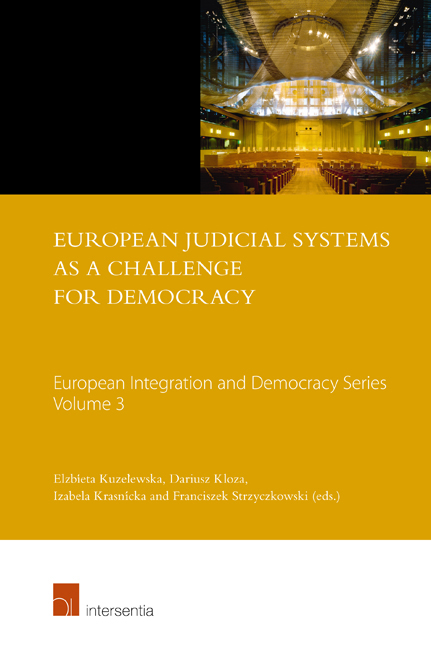Book contents
- Frontmatter
- Foreword
- Preface
- Contents
- List of Abbreviations
- PART ONE THE COURT OF JUSTICE OF THE EUROPEAN UNION
- 1 Democracy in Constitutional Politics of European Courts: An Overview of Selected Issues
- 2 The Institutional Balance as CJEU's Contribution to Democracy in the Union: Selected Issues
- 3 From Judicial Dialogue Towards Constitutional Spill-Over? The Economic Analysis of Preliminary Reference Procedure and the Application of the EU Charter of Fundamental Rights
- 4 Towards the Democratization of the EU? Strengthening prerogatives of the European Parliament in the case law of the Court of Justice of the European Union
- 5 Democratic Values in the Court of Justice Adjudication on the Private Enforcement of the European Union Competition Law
- 6 Judicial Control of Monetary and Fiscal Decisions in the European Union
- 7 How CJEU's “Privacy Spring” Construed the Human Rights Shield in the Digital Age
- 8 The Supremacy of the EU Law as Interpreted by the Polish Constitutional Tribunal
- 9 Reception of EU Law in Polish Courts – A Case of “Teddy Bear” Law
- 10 Enforcing Europe's Foundational Values in Central and Eastern Europe: A Case in Point
- PART TWO THE EUROPEAN COURT OF HUMAN RIGHTS
4 - Towards the Democratization of the EU? Strengthening prerogatives of the European Parliament in the case law of the Court of Justice of the European Union
from PART ONE - THE COURT OF JUSTICE OF THE EUROPEAN UNION
Published online by Cambridge University Press: 15 December 2017
- Frontmatter
- Foreword
- Preface
- Contents
- List of Abbreviations
- PART ONE THE COURT OF JUSTICE OF THE EUROPEAN UNION
- 1 Democracy in Constitutional Politics of European Courts: An Overview of Selected Issues
- 2 The Institutional Balance as CJEU's Contribution to Democracy in the Union: Selected Issues
- 3 From Judicial Dialogue Towards Constitutional Spill-Over? The Economic Analysis of Preliminary Reference Procedure and the Application of the EU Charter of Fundamental Rights
- 4 Towards the Democratization of the EU? Strengthening prerogatives of the European Parliament in the case law of the Court of Justice of the European Union
- 5 Democratic Values in the Court of Justice Adjudication on the Private Enforcement of the European Union Competition Law
- 6 Judicial Control of Monetary and Fiscal Decisions in the European Union
- 7 How CJEU's “Privacy Spring” Construed the Human Rights Shield in the Digital Age
- 8 The Supremacy of the EU Law as Interpreted by the Polish Constitutional Tribunal
- 9 Reception of EU Law in Polish Courts – A Case of “Teddy Bear” Law
- 10 Enforcing Europe's Foundational Values in Central and Eastern Europe: A Case in Point
- PART TWO THE EUROPEAN COURT OF HUMAN RIGHTS
Summary
INTRODUCTION
Individuals conceptualize the term democracy in a variety of ways. While in the 19th century democracy was associated with a direct form of government in Athenian style, a major breakthrough with the development of nation-states and the prevalence of representation was the foundation for the development of representative democracy.
Representation means transformation of the individuals’ will to the will of the political institutions. Thus, in a representative democracy, public authorities should have democratic legitimacy following citizens’ choice. This statement is a starting point for the reflection in terms of democratic legitimacy, reflection transposed on the ground of the integration processes in Europe. As a result of the creation of the European Community and the European Union, there has been a further relocation of the part of public power. Therefore, public powers exercised by the EU institutions must have democratic legitimacy.
There is a consent that mainstream theories of state democratization are illequipped to explain EU democratization as they are bonded to the nation-state context. The issue of democratic deficit in the EC yielded a vast, heterogeneous literature, notably after the publication of the Tindemans report in 1975, in which, for the very first time, the distance between citizens and the institutions of the EC was acknowledged. Thus, a wide debate on political reforms so as to achieve a more democratic EU has been started, bringing numerous potential solutions to this problem that vary in range and scope. In the debate on democratic deficit in the EU, it is argued that the EU policy is dominated by unelected bodies and directly elected EP plays a secondary role. As a result, the claims on greater power of parliamentary assembly arose such as – for instance – a proposal that the EP should have an independent power of legislative initiative. Majonefi nds such an argumentation as based on the analogy with national institutions. Moravcsik adds that political decision-making should not always be majoritarian and this could be the case in Europe. Still, the Community's 50-year trajectory “from an international organization with very limited traits of democracy to one that has the major institutional trappings of a democratic polity” is marked by the enhancement of the European Parliament's prerogatives.
- Type
- Chapter
- Information
- European Judicial Systems as a Challenge for Democracy , pp. 57 - 72Publisher: IntersentiaPrint publication year: 2015



